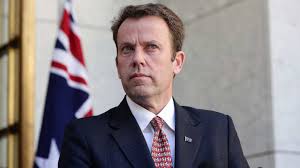By Nicholas Stuart.
Labor’s education spokesperson is threatening to prevent students with a low ATAR from studying education. Exactly how Tanya Plibersek would do this and what mechanism she’d use to achieve her goal isn’t clear. After all, the whole premise of our tertiary system is that universities are independent – although there are always ways around minor issues like this for a determined autocrat.
Besides, nobody would want vice-chancellors to be forced to choose between their principles and a bucket of money; you’d be knocked over in the rush. The result would not be an academic dilemma so much as a foregone conclusion.
Not that the minister, Dan Tehan, offers us much of an alternative. He spent most of Tuesday fulminating about the need for discipline, more discipline. One almost suspects he’d bring back the cane if he had his way …
The real surprise is that Plibersek didn’t think to simply pay teachers more money. Maybe she’s unaware this is the usual way of increasing job applications.
The other way of boosting enrolments is to offer discounts on university training or even pay people to study. That’s what we do for the military. Putting someone through the Defence Force Academy costs more than half a million, even before actual officer training.
Perhaps that’s why Labor’s reluctant to offer discounts to anyone studying education: it would create a precedent.
Nursing, for example, is another profession that would benefit from discounted degrees. But offering scholarships would distort the market, and soon you’d be making a mockery of the tertiary system Labor was so proud of creating.
Much easier just to wave a big stick.
But either we have a free-market or we don’t. The reason high-scoring students clamour to work as doctors, lawyers or (shudder) even accountants, rather than embracing the excitement of teaching, is because such jobs generally pay better and offer more prestige. And not everyone is cut out to deal with the excitement and challenge of coping with thirty tired, fractious and nettlesome teenagers between 2.30 and 3 on a cripplingly hot Friday afternoon before the final bell for the week. Addressing the shortfall of high scoring applicants might have more to do with these downstream issues than anything the universities are capable of addressing.
The saddest aspect of Pliberseck’s call for higher entry standards is, though, that it suggests she doesn’t ‘get’ what education is all about.
Its central purpose is to change people; developing their capacity and adding to their natural ability and knowledge. Pliberseck seems to be suggesting that everyone’s intelligence is fixed; set in stone and measured perfectly by the HSC.
Which leaves the entire purpose of university education as something of a mystery. Isn’t it meant to stimulate and extend students? Is everyone to be forever categorised as a low, or high, achiever simply because of a mark in year 12? Is this really what she’s suggesting?
None of this is to suggest that education in Australia couldn’t be significantly improved – it can. It’s just a pity that Labor’s now playing the easy game, focusing in on low scores, rather than coming up with creative ideas to boost the averages. It’s also highly doubtful that more regulation, or arbitrary cut-offs, will provide any solutions no matter how popular such knee-jerk, simplistic and popular positioning may prove to be. Nothing Plibersek has said is likely to boost student interest in the subject – rather the reverse.
This is a shame because there are so many easy, dramatic, and creatively productive changes that could transform education.
Take starting ages. State governments don’t yet seem to have discovered that children are born all through the year. Yes, that’s right – every month! Schools, however, only begin once during this same period. This means, inevitably, that many students haven’t achieved the right degree of maturity to begin school: they have to be pushed forward or held back. Think of how much better it would be if there were two commencements each year, just as for universities. Parents would love it! It would be good for children, so why don’t the politicians push it?
Is it really too hard and too difficult? Or are we just too lazy?
And later, in secondary school, students are told they need to master STEM subjects to understand computing. Why not just engage students imagination by introducing coding and programming as separate subjects. Mike Cannon-Brookes, the Atlassian co-founder, funds a team traveling to schools in NSW to do exactly this. He’s engaging students and stimulating them with real-world challenges. They’re responding. Why is this beyond the imagination of our politicians?
Unfortunately, curricula departments across the nation seem more concerned with polishing their current offerings instead of standing back to consider which skills might best assist students to engage as future citizens. This is understandable, but it’s not a way to embrace the sort of transformative change we need. Perhaps (and I hate to admit this) even learning about SMSF’s at school might have better helped me navigate the modern world than understanding how the steady development of the Spartan navy allowed it to eventually claim victory in the Peloponnesian War. And how about the urgent need to boost the learning foreign languages (and not necessarily Ancient Greek)?
There’s far more to worry about in our tertiary education sector than the entry scores for particular courses.
Source of the article: https://www.smh.com.au/education/australia-s-education-system-needs-transforming-20190115-p50ri6.html







 Users Today : 28
Users Today : 28 Total Users : 35403221
Total Users : 35403221 Views Today : 41
Views Today : 41 Total views : 3332480
Total views : 3332480